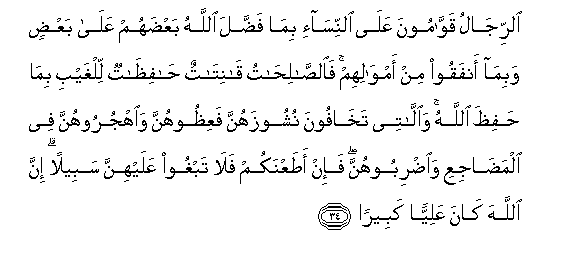
linked article by Nuh
Hah Mim Keller
with opening comments
by Syed Mumtaz Ali
Nuh Ha Mim Keller begins his article by using one translation of the Quran Sura 4 Verse 34.
To give our readers a general idea as to how the beautiful Quranic term qawwamuna can be interpreted (translated) several ways, thus giving distinct shades of meaning every time, we are providing here below the following English translations from five different translators. But first here is the Arabic version of this verse:

English Translations of Qur'an 4:34:
1. Yusuf Ali
Men are the protectors and maintainers of women, because Allah has given the one more (strength) than the other, and because they support them from their means. Therefore the righteous women are devoutly obedient, and guard in2. Marmaduke Pickthal
(the husband's) absence what Allah would have them guard. As to those women on whose part ye fear disloyalty and
ill-conduct, admonish them (first), (Next), refuse to share their beds, (And last) beat them (lightly); but if they return to
obedience, seek not against them Means (of annoyance): For Allah is Most High, great (above you all).
Men are in charge of women, because Allah hath made the one of them to excel the other, and because they3. M.H. Shakir
spend of their property (for the support of women). So good women are the obedient, guarding in secret that which Allah hath guarded. As for those from whom ye fear rebellion, admonish them and banish them to beds apart, and scourge them. Then if they obey you, seek not a way against them. Lo! Allah is ever High, Exalted, Great.
Men are the maintainers of women because Allah has made some of them to excel others and because they spend4. T.B. Irving
out of their property; the good women are therefore obedient, guarding the unseen as Allah has guarded; and (as to) those on whose part you fear desertion, admonish them, and leave them alone in the sleeping-places and beat them; then if they obey you, do not seek a way against them; surely Allah is High, Great.
Men are the ones who should support women since God has given some persons advantages over others, and because5. Dr. Muhammad Muhsin Khan
they should spend their wealth [on them]. Honorable women are steadfast, guarding the Unseen just as God has it guarded. Admonish those women whose surliness you fear, and leave them alone in their beds, and [even] beat them [if necessary]. If they obey you, do not seek any way [to proceed] against them. God is Sublime, Great. If you fear a split between a man and his wife, send for an arbiter from his family and an arbiter from her family. If both want to be reconciled, God will arrange things between them. God is Aware, Informed. Worship God [Alone] and do not associate anything with Him.
Men are the protectors and maintainers of women, because Allâh has made one of them to excel the other, and
because they spend (to support them) from their means. Therefore the righteous women are devoutly obedient (to
Allâh and to their husbands), and guard in the husband's absence what Allâh orders them to guard (e.g. their chastity,
their husband's property, etc.). As to those women on whose part you see illconduct, admonish them (first), (next),
refuse to share their beds, (and last) beat them (lightly, if it is useful), but if they return to obedience, seek not against
them means (of annoyance). Surely, Allâh is Ever Most High, Most Great.
Now
click here for Nuh Ha Mim Keller's article
Nuh Ha Mim Keller has written a booklet entitled "Becoming Muslim" it is a personal account of his "conversion" to Islam.
Mr. Keller, born in 1954 in the northwest United States, was educated in philosophy and Arabic at the University of Chicago and UCLA. He embraced Islam in 1977 at al-Azhar in Cairo. He later studied the traditional Islamic Sciences of hadith, Shafi'i and Hanafi jurisprudence, legal methodology (usul al-fiqh), and tenets of faith (`aqidah) in Syria and Jordan, where he has lived since 1980. His English translation of `Umdat al-Salik [The Reliance of the Traveller] (1250 pp., Sunna Books, 1991) which is a well-known translation of the Shafi'i manual of Fiqh and is the first Islamic legal work in a European language to receive the certification of al-Azhar, the Muslim world's oldest institution of higher learning. He also possesss ijazas or `certifiates of authorisation' in Islamic jurisprudence from shaikhs in Syria and Jordan
His other translations and works include: Al-Maqasid: Imam Nawawi's Manual of Islam;The Sunni Path: A Handbook of Islamic Belief; and Tariqa Notes. He is currently translating Imam Nawawi's Kitab al-Adhkar [The Book of Remembrance of Allah], a compendium of some 1227 hadiths on prayers and dhikrs of the prophetic sunna.
On
this page you can find the writings of Shaikh Nuh Ha Mim Keller, an
Islamic scholar who is also a Shaikh of the Shadhili tariqa.
"Shaikh Nuh Ha Mim Keller is originally from the USA, though he is now
based in Jordan. His writings are a beacon of guidance towards true
Islam for many Muslims of today, particularly those in the West." [D.A.
Rice]